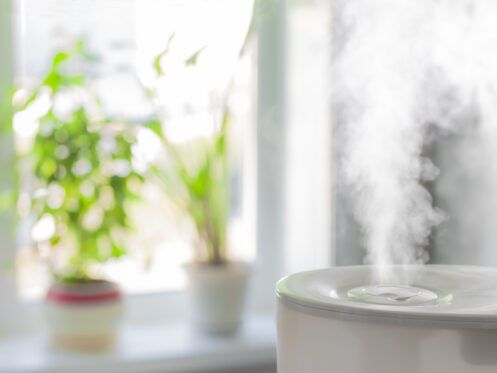Being a responsible homeowner isn’t just about paying bills on time or mowing the lawn—it’s also about taking care of your appliances. Think about it: your HVAC system keeps you cozy in winter and cool in summer, while a humidifier maintains optimal moisture levels. But here’s the kicker: essential oils, as awesome as they are, can cause some serious headaches for your humidifier.
What Are Essential Oils and Why Do People Use Them?
Essential oils, extracted from plants through various methods like distillation or cold pressing, are potent, aromatic compounds renowned for their therapeutic properties. People use them for a myriad of reasons, ranging from promoting relaxation and reducing stress through aromatherapy to addressing specific health concerns like headaches or skin conditions. Their versatility extends beyond wellness, finding applications in natural cleaning products and DIY beauty concoctions. Whether diffused in the air, applied topically or incorporated into homemade remedies, essential oils offer a holistic approach to well-being.
Why Do People Use Humidifiers?
People use humidifiers for various reasons, primarily to maintain optimal humidity levels indoors. These devices add moisture to the air, which can alleviate dryness in the skin, throat and nasal passages, especially during the dry Chatham winter months or in arid climates. Improved humidity can also help ease symptoms of respiratory conditions like asthma or allergies by keeping the airways moist. Humidifiers are popular for creating a comfortable environment conducive to better sleep and overall well-being.
The Risks of Mixing Essential Oils with Humidifiers
Essential oils have gained popularity for their therapeutic benefits, but when mixed with humidifiers, they can pose significant risks to both the device and your health. Here’s a look at some of those risks.
Damage to the Humidifier
Essential oils pack a punch—they’re super concentrated and full of compounds that can mess with your humidifier. When you dump essential oils straight into the water tank, they start wreaking havoc on the plastic and rubber bits inside. That means leaks, glitches and, in the worst-case scenario, your trusty humidifier might completely break down and quit working.
Release of Harmful Chemicals
When heated or diffused, some essential oils can undergo chemical changes or react with the humidifier’s mechanisms, producing toxic byproducts or volatile organic compounds. These airborne pollutants can irritate the respiratory system, trigger allergies and exacerbate existing health conditions.
Fire Hazard
Mixing essential oils with humidifiers can be a fire hazard, especially citrus oils like lemon or orange—they’re extremely flammable. When these oils get heated up or come into contact with the electrical bits inside the humidifier, it’s like playing with fire, literally. Not to mention, if they touch hot surfaces, it’s a recipe for disaster.
Is There a Special Humidifier That Works With Essential Oils?
Yes, there is. Ultrasonic humidifiers offer the best of both worlds. These nifty gadgets not only humidify the air but also allow you to add your favorite essential oils for a delightful aromatherapy experience. Ultrasonic humidifiers work with essential oils because they use ultrasonic vibrations to create a fine mist, which easily disperses the oils into the air. Other types, like evaporative or steam humidifiers, may not have a mechanism to safely distribute essential oils.
Do Certain Oils Work Better With Ultrasonic Humidifiers?
Although most essential oils are safe to use with ultrasonic humidifiers, the chemical make-up or scent of some oils can make them more effective. Lighter oils, such as citrus oils (like lemon or orange) and floral oils (like lavender or rose), tend to disperse more easily in the mist created by ultrasonic humidifiers. However, heavier oils, like sandalwood or patchouli, may not diffuse as effectively.
Safe Alternatives to Using Essential Oils in Humidifiers
Now that you understand the risks of mixing essential oils with most types of humidifiers, you may wonder how to use them correctly. The truth is, there are several ways to enjoy their soothing scents and therapeutic benefits.
Separate Diffusers for Essential Oils
Instead of risking your humidifier’s well-being, invest in a separate diffuser specifically designed for dispersing essential oils. These nifty gadgets come in all shapes and sizes, from sleek ultrasonic diffusers to classic reed diffusers. Just add your favorite essential oils, and voilà—instant aromatherapy without the risk.
Topical Application and Inhalation Methods
Did you know that you don’t need a humidifier or some fancy gadget to enjoy essential oils? You can still reap the benefits by applying them topically or inhaling them directly. Mix a few drops of essential oil with a carrier oil like coconut or almond oil for a DIY massage blend. You can even add a drop to a tissue and take a few deep breaths for a quick mood boost. It’s simple, effective, and, best of all, safe. Just always read the label and follow recommended usage guidelines to ensure you’re using the essential oils safely.
Cleaning Solutions
Skip the store-bought chemical cleaners and whip up your own natural cleaning solutions using essential oils. Lemon oil, tea tree oil and lavender oil are all excellent choices for disinfecting surfaces and leaving your home smelling fresh and clean. Add essential oils such as pine, eucalyptus or lavender to a bucket of warm water and a gentle floor cleaning solution to create a fragrant and effective cleaner for mopping floors. Toss a moist washcloth or dryer balls scented with a few drops of essential oils into the dryer with your clothes. This does double duty as an all-natural fabric softener and fragrance booster.
Tips for Using Humidifiers Safely and Effectively
Whether you opt for a humidifier that works with essential oils or not, it’s important to use the device safely. This will require taking proactive maintenance steps.
Cleaning and Maintenance Guidelines
Regularly cleaning the humidifier is key to preventing mold, bacteria and other nasty stuff from building up in the water tank and getting pumped into the air. Follow the manufacturer’s instructions for cleaning and disinfecting your humidifier, and don’t forget to replace the filter regularly.
Monitoring Humidity Levels
Here’s the deal with humidity levels: too little, and you’re left with dry skin, a scratchy throat and all-around discomfort. Too much, and you’re looking at mold growth and potential respiratory issues. Aim for that sweet spot—around 30–50% humidity—to keep things comfortable and healthy. Most humidifiers come with built-in hygrometers to help you monitor humidity levels, but you can also get standalone ones if needed.
Choosing the Right Type of Humidifier
When it comes to humidifiers, one size doesn’t fit all. There are different types to choose from, each with its own pros and cons. For smaller spaces like bedrooms or offices, consider a cool mist humidifier—they’re quiet, energy-efficient and safe to use around kids and pets. If you’re dealing with hard water or want to add some essential oils to the mix, an ultrasonic humidifier might be the way to go. Just remember to clean it regularly to prevent mineral buildup.
Pipe Works Services can help with maintenance for all the appliances in your home. We work on HVAC systems, plumbing, electrical work and more. Contact us now to learn more about using a humidifier in your Chatham, NJ home.





